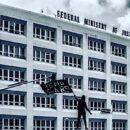What Price Justice?
 Ask an international human rights lawyer and the director of a human rights organization, and they will tell you that justice has no price.
Ask an international human rights lawyer and the director of a human rights organization, and they will tell you that justice has no price.
That’s not the case in Muslim tribal societies, at least when homicide is committed in inter- or intra-tribal disputes. The customary way of settling securing justice is through the payment of bloodmoney (diya). A big task of the arbitrator in such a case is putting the price on the human life that has been taken. Islamic Law is a guide but not a final determinant.
Justice (adala) demands more than obtaining the procedurally perfect criminal conviction (or acquittal). Justice ranges from payment of compensation or bloodmoney to fixing the entire socio-political system. All of which have a price.
One of Adam Smith’s points in his book, After Genocide: Bringing the Devil to Justice, is that international justice is expensive. That’s an understatement. Perhaps, having decided that justice should not be subject to monetary calculus, the lawyers whose business is international justice accidentally added a zero or two to their fees, so inattentive are they to numbers. Or, just possibly, could there be an iota of self-interest at work?
Smith informs us that for the same amount as the budget of the ICTY in 2006/07 (nearly $280 million), a Sarajevo law student said: “the entire judicial system of the Balkans could have been reconstructed.” (p. 25) Later, Smith is more precise: the Sarajevo war crimes court house and two years of its operation cost $16 million, which is equal to one month’s work in The Hague (p. 335) Smith calculates that the international justice system achieves five convictions per year at a cost of $20 million each. He adds, “By some measures, this renders it the least efficient prosecutorial system in the history of recorded justice.” (p. 47) Value for money? I think not.
But the people who promote international justice have a lot of clout. A lot more clout than the people in whose name they practice. Smith describes how on the tenth anniversary of the Srebenica massacre, local people who had lost relatives and friends in the massacre were stuck in a ten-mile traffic jam while international dignitaries in their escorted cars got pride of place, overtaking the queue to attend the ceremony.
International justice may be “right,” but does it work? Smith describes so many problems with the system that one wonders why anyone thought it was a good idea in the first place. He asks, “How many of these concerns are a function of the growing pains associated with the rebirth of international criminal justice and how many are intrinsic to the international imposition of criminal justice?” (p. 196) It’s pretty clear he thinks the latter.
Closer to home, in Africa, Smith suggests that the international justice system’s obsession with criminal trials is at variance with African ideas of justice that give a bigger role to reconciliation and forgiveness. There is more than a germ of truth in this. Smith describes a chief in Sierre Leone saying he cannot disown the perpetrators of crimes who are part of his wider community, and must forgive them. (p. 42) This sentiment is widespread, and Smith rhetorically asks, “Is it the task of an international court to tell them they are wrong, that they need “˜justice’ against the brothers they have welcomed back into their fold?”
Still closer to home, in Sudan, Smith makes the elementary point that there is no prospect of international justice while the Sudan government rejects it. But, he observes, as soon as it lifts its objection, trials are best held in Sudan.







I’m curious whether those who have read the book, and do not seem to have thought that comparative analysis of the “costs of justice” was important in reviewing abook whose main idea seems to be that international justice of the ICC variety is expensive, would care to comment on the comparative costs. A quick websearch (I typed: murder “estimated to have cost”, into Google) for example turned up:
“Toole says a defense in a death penalty case can cost as much as $1.6 million — without all the appeals. Between 1995 and 1999, the prosecution and defense in all New York death penalty cases was estimated to have cost $68 million. Simply preparing 24 copies of Harris’s 22,000-page trial transcript cost almost $45,000.”
ICC-style justice I could easily imagine being the most expensive kind since many of the issues at stake are novel legal issues, since much translation is required, since the whole point of the trials is that local justice is not capable of rendering justice, etc. etc. So if an ICC trial were $20 million when considering a case against a head of state, and a local death penalty trial in the U.S. were $2 million, would we really think that there was something wrong with the ICC system? Especially in its early days when it is just getting started? The argument seems overblown to me.
Don’t get me wrong- international organizations are generally farcical in their cost overruns. But look at the Abyei arbitration- that was expensive for all kinds of reasons besides holding it in a gilded hall.
Ana
I repeated Ana Majnun’s Google websearch exercise with the search words “fraud trials cost” and found the top entry was the collapse of fraud trial in London at a cost to the taxpayers of 60 million pounds, and an estimate that another British fraud trial would cost more than 2 million pounds in legal aid.
What does it tell us about justice that the most expensive forms of criminal justice are fraud trials, American death penalty cases, and international criminal tribunals?
Fraud trials (and other trials over complicated commercial issues like intellectual property rights and antitrust cases), involve extremely elaborate issues of law and are contested between states and large corporations. The financial stakes of winning and losing are comparably high and the process routinely takes off into a kind of legalistic stratosphere in which a grounded sense of “justice” is left far behind. The cases are resolved by legal techncality and negotiation, a complex kind of bargaining among a peer group of capitalists and regulators.
America has a particular obsession with the death penalty, which is fetishistic within the context of a dysfunctional penal system, which is more expensive than a university education system. The use (or abuse) of the death penalty in the United States is discredited according to any objective criteria of justice or equity, or indeed cost-effectiveness.
The fact that international justice stands comparison, on a strictly financial accounting basis, with these examples of legal hypertrophy, driven respectively by the greed of global capitalism and an irrational vengefulness, speaks for itself. The comparison exorably leads to the conclusion that something in the international justice superstructure is out of kilter with fundamental principles of human dignity and the collective good, and that the willingness of states to shoulder these costs reflects an ideological exuberance that will in due course fall victim to its internal contradictions.
Bravo Abd al-Wahab! All I can say in retort is that your own hypertrophied prose will likewise succumb to internal contradictions, but in the meantime… highly enjoyable!
Ana
So if an ICC trial were $20 million when considering a case against a head of state, and a local death penalty trial in the U.S. were $2 million, would we really think that there was something wrong with the ICC system?
An international human rights lawyer and the director of a human rights organization, and they will tell you that justice has no price.The customary way of settling securing justice is through the payment of blood money.So the law about human rights should be implemented.